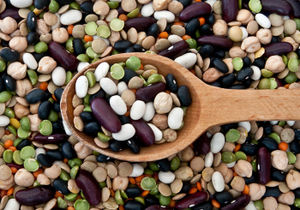Choline
| See Also | Vitamins |
|---|
| Article | Phospholipids choline, serine, and inositol, IHP, [2], September 2011 |
|---|
Choline is crucial for its role in the making of the important neurotransmitter acetylcholine, which is a part of many brain processes including memory. It also is part of the manufacturing of phosphatidylcholine (i.e. lecithin) and sphingomyelin which are components of cell membranes within the body. Furthermore, choline helps with metabolism of fats, specifically, exporting fat out of the liver (lipotropic effect).
Contents
Food Sources
The following foods have the highest concentration of choline. For a more expansive list on food sources of specific nutrients visit Health Canada's Dietary Reference Intakes for Vitamins or USDA's National Nutrient Database
Other food sources include:[1]
- grains: grains
- protein sources: liver
- vegetables: cauliflower, lettuce
- dairy: egg yolks,
- Other sources include: legumes, soy
Uses
The following is a list of the primary uses of choline. [2]
- Liver Disorders: Choline has been used for a variety of liver conditions including: acute viral hepatitis, alcohol-induced fatty liver, chronic hepatitis, cirrhosis of the liver, decreased bile solubility, diabetic fatty liver, drug-induced liver damage, toxic liver damage
- Elevated cholesterol levels: Phosphatidylcholine increases the solubility of cholesterol which in turn decreases its ability to induce atherosclerosis; it has been shown to help improve the overall lipid profile (decreases LDL and triglycerides, and increases HDL), removes cholesterol from tissues, and inhibits platelet aggregation. All of these benefits may be due to the fatty acid, linoleic acid, which is a part of the phosphatidylcholine structure.
- Alzheimer's Disease: Many scientists believe that the deterioration of the brain's functioning in Alzheimer's Disease is likely related to a decrease in acetylcholine levels. The inherent defect actually appears to be in the enzyme which forms acetylcholine, so supplementation with phosphatidylcholine may not necessary treat the disease. However, it is recommended in cases of mild to moderate dementia to try supplementation; if no improvement is noticed within 2 weeks, supplementation can be stopped.
- Bipolar Depression: Some evidence exists that the manic episodes which are apart of bipolar depression are a result of decreased acetylcholine activity in the brain. The use of phosphatidylcholine supplementation to increase these levels has shown to improve or ameliorate manic symptoms in some patients.
Deficiency Symptoms
Choline has been designated an essential nutrient in the human diet. When humans are fed a choline-deficient diet, they acquire symptoms of fatty infiltration of the liver and other signs of liver dysfunction.
Excess Symptoms
At high doses of phosphatidylcholine, one may experience the following symptoms:
- reduced appetite
- nausea
- abdominal bloating
- gastrointestinal pain
- diarrhea
Choline at high doses may produce a "fishy" odor.
Prescribing Considerations
- Choline is available as a soluble salt (most commonly as choline bitartrate, citrate, or chloride) or as phosphatidylcholine in lecithin.
- Most commercial lecithin only contains about 10-20% phosphatidylcholine. Phosphatidylcholine supplements contain about 35%. Newer preparations contain up to 98% phosphatidylcholine. The later is the ideal form to take as they are associated with fewer side effects and in cases which require higher therapeutic doses, are more cost effective as less supplement is needed [2]
- The recommended dosages varies based on age and health status. To determine what your specific requirements are talk to your naturopathic doctor or other trained medical professional.
Safety
Choline and phosphatidylcholine are generally well tolerated.
- Contraindications: Phosphatidylcholine is not indicated in patients with depression (unipolar or clinical depression) unless under supervision of a physician as high-dosage can worsen depression in some cases.
Drug Interactions
- Drug Interactions include: There are no known drug interactions.
Nutrient Interactions
- Nutrient Interactions include: [2]
- Folic Acid and L-Carnitine - Choline helps to conserve folic acid and carnitine.
